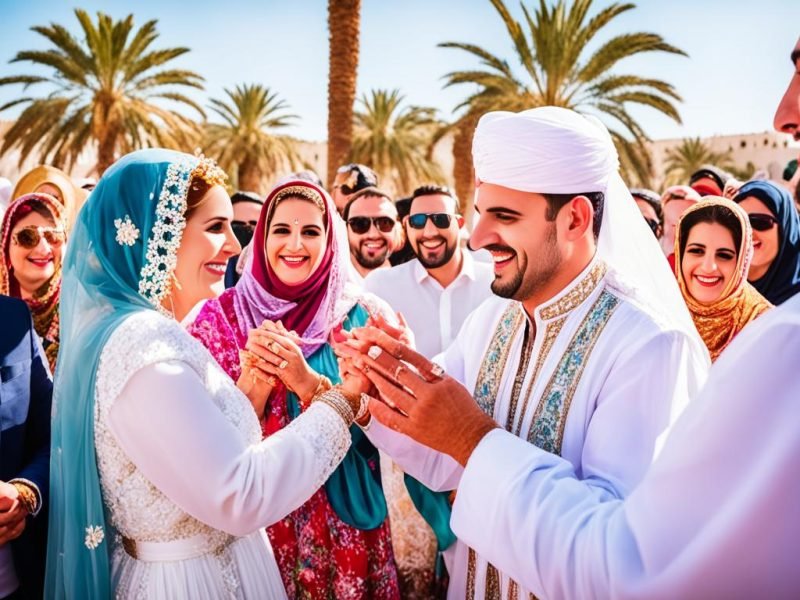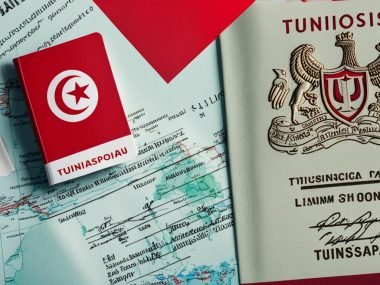If you’re considering a destination wedding with a blend of Arab culture and Mediterranean charm, Tunisia might just be the perfect choice. But before you get swept away by the idea, it’s crucial to understand the Tunisia wedding requirements for foreigners. As per Tunisian Law No. 57, foreigners can indeed tie the knot in Tunisia, provided they adhere to certain protocols.
Understanding the Tunisian marriage laws for foreigners is essential. Marriages are officiated by the City Hall Registry Office, where you must present the required documents and ensure compliance with both Tunisian and your home country’s legislation. This means no lengthy residency periods or publication of bans, simplifying the process for those eager to marry in this North African nation. It’s an attractive option for many, whether it’s a Tunisian individual marrying a foreigner or a foreigner desiring to marry in Tunisia —the requirements remain straightforward and accessible.
So, if you’re planning on getting married in Tunisia as a foreigner, the process is quite accommodating, and preparing ahead will help ensure your special day is as seamless as possible.
Key Takeaways
- Foreigners can legally marry in Tunisia by fulfilling specific conditions under Tunisian law.
- The City Hall Registry Office is the authority that officiates marriages in Tunisia.
- There are no residency requirements or bans publications for foreigners wishing to marry in Tunisia.
- Both Tunisian and foreign national laws must be complied with for a marriage to be valid.
- Documentation from your home country’s embassy is required for marriage in Tunisia.
- Religious ceremonies can follow the civil marriage if couples choose.
- The marriage process is inclusive of various couple combinations, including Tunisian and foreign nationals.
Understanding Tunisian Marriage Laws for Foreigners
If you’re considering tying the knot in the beautiful country of Tunisia, it’s essential to familiarize yourself with the Tunisian marriage laws for foreigners. The process can be quite straightforward as long as you adhere to the local legislation and ensure your paperwork is in order. Let’s delve into what you need to know to make your union official.
An Overview of Legal Requirements
When getting married in Tunisia as a foreigner, understanding the legal landscape is paramount to ensuring a smooth union. Your marriage must be valid under Tunisian law, as well as compliant with the regulations of your home country. To this end, several critical documents must be procured and steps followed to fulfill all official requirements.
Marriage Validation: Compliance with Foreign and Tunisian Laws
<img src=”https://seowriting.ai/32_6.png” alt=”Can foreigners get married in Tunisia”>
As a foreigner looking to get married in Tunisia, securing an affidavit of eligibility to marry is a crucial first step. This document acts as a sworn statement from both parties, asserting that there are no legal impediments to the marriage. Embassies or consulates in Tunisia, such as the American Embassy for US citizens, are responsible for issuing this affidavit, typically for a fee. Important too is obtaining a medical certificate free of contagious diseases and mental illness—another testament to the readiness for marriage.
No Residence or Publication of Bans Necessary
Unlike in some countries, can foreigners get married in Tunisia without residency requirements or the publication of bans? Yes, in Tunisia, there is no requirement for either party to hold residency status or for a public announcement of the marriage to be made in advance, simplifying the process considerably. However, keep in mind that other documentation, such as birth certificates, valid passports, records of any previous marriage dissolutions, or a death certificate for previous spouses, remain essential.
To further demystify the process, here’s a breakdown of the main documents you’ll need:
| Document Type | Details and Remarks |
|---|---|
| Affidavit of Eligibility to Marry | Executed at your embassy/consulate, confirms freedom to marry |
| Medical Certificate | Certifies the absence of contagious diseases and mental illness |
| Birth Certificate | Must be recent and validated |
| Valid Passport | Proof of identity and nationality |
| Divorce Decree/Death Certificate | If applicable, from your home country |
| Parental Consent | For individuals under 20 years of age |
| Identification Details | Full names, dates of birth, places of residence, etc. |
| Witness Information | Names of two legal witnesses present at the ceremony |
Keep this information on hand as you plan your special day. Understanding and complying with the Tunisian marriage laws for foreigners will ensure that your wedding is recognized both in Tunisia and your home country.
The Legal Process for Foreigners Getting Married in Tunisia
Embarking on the journey to seal your love through marriage can be incredibly romantic, and Tunisia offers a picturesque backdrop for such a significant moment. Before you can take your vows under the Tunisian sun, you need to navigate through some legal waters. Understanding the Tunisia wedding requirements for foreigners is essential to ensure your special day is not just memorable but also legally binding.
Required Documentation for Marriage in Tunisia
As a foreigner, you will have to collect several documents and get them properly translated for the Tunisian authorities. Here’s a checklist:
- Birth certificate, complete with the seal of the issuing authority.
- Valid passport for identification abroad.
- An affidavit of eligibility to marry to attest your free marital status.
- A medical certificate, which should be no older than two months, obtained from an authorized Tunisian doctor.
These are just the basics. If you or your partner have been married previously, be prepared to present either a recognized divorce decree or a death certificate for the deceased spouse. Should you be younger than 20, Tunisia requires written consent from a parent or guardian. All non-English documents will need certified translations in either Arabic or French—the official languages of Tunisia.
Official Procedures at the City Hall Registry Office
The stage where all your preparation culminates is the City Hall Registry Office. Here, you’ll have to declare your intention to marry, furnish the personal identification details, and introduce the two legal witnesses who will vouch for your union. While you can expect a multitude of currencies and payment methods to be accepted, specific fees like the $50 charge for the marriage affidavit at the American Consular Office are unavoidable for U.S. citizens.
| Document | Description | Authority | Remark |
|---|---|---|---|
| Birth Certificate | Must include issuing authority’s seal | Home country’s civil registry | Translated if not in English |
| Passport | Current and valid for identification | Home country’s government | Ensure entry stamp is up-to-date |
| Affidavit of Eligibility to Marry | Confirming both parties are free to marry | Respective Embassies in Tunisia | American Consular fee is $50 |
| Medical Certificate | Clearance of certain health conditions | Authorized Tunisian doctors | No older than two months at marriage time |
Should you adhere to these requirements for foreigners getting married in Tunisia, you will be set to embark on your new life together with all due formalities sorted. Remember that your patience with the paperwork pays off in the form of a legally recognized marriage in the beautiful, culture-rich surrounds of Tunisia.
Specific Provisions for Different Couple Combinations
When considering foreigners getting married in Tunisia, it’s important to understand the inclusive Tunisian marriage laws for foreigners that have been designed to accommodate a variety of couple formations. Regardless of nationality or religious background, these provisions ensure every couple can celebrate their union surrounded by the stunning beauty and rich culture of Tunisia.
Tunisian men have the freedom to marry foreign women under local laws, creating a relatively straightforward legal process. On the other hand, foreign non-Muslim men looking to marry Tunisian Muslim women will find the country welcoming, as Tunisia does not impose additional legal conditions based on religion or nationality in these cases.
For foreign couples both coming from overseas, the requirement is to obtain the necessary documentation from their respective embassies. This is in line with the standard procedure ensuring respect for both Tunisian customs and the legal standards of their home countries.
To give you a clearer picture, the following information outlines the different requirements for various couple combinations looking to get married in Tunisia:
| Tunisian Men with Foreign Women | Foreign Non-Muslim Men with Tunisian Muslim Women | Foreign Couples |
|---|---|---|
| Comply with general Tunisian marriage requirements. | No additional religious stipulations required. | Acquire personal documents from respective embassies. |
| Secure documentation from the woman’s embassy. | Secure documentation from the man’s embassy. | Respect the marriage laws of both home countries. |
Regardless of the couple’s makeup, everyone must adhere to the core elements of Tunisian marriage laws for foreigners to ensure your marriage is recognized both in Tunisia and your home country. By doing so, foreigners getting married in Tunisia can ensure their special day is both memorable and legally sound. For further guidance, consult with embassy officials or a legal expert proficient in Tunisian marriage law to facilitate a seamless experience.
Tunisia Wedding Requirements for Foreigners: Documents and Affidavits
If you’re planning on getting married in Tunisia as a foreigner, it’s imperative to be well-versed with the comprehensive set of requirements set forth by Tunisian authorities. The meticulousness of the paperwork ensures that both Tunisia wedding requirements for foreigners and those stipulated by international laws are met. Let’s delve into the essentials that form the bedrock of a valid marriage procedure in Tunisia.
Breaking Down the Essential Paperwork
You will need to commence the journey by gathering the quintessential documents: a valid identity card or passport, and a recent birth certificate, dated not older than 20 days from the marriage application date. The Tunisian Government insists on updated records to establish the current legal status of all foreign nationals desiring to tie the knot. For widows, widowers, and divorcees, additional documentation such as death certificates or divorce decrees from prior unions must be procured to provide unequivocal evidence of one’s freedom to marry. Your preparation should align with the knowledge that Tunisian marriage laws for foreigners emphasize transparency and thoroughness.
Navigating Affidavits of Eligibility
Another significant hurdle is the affidavit of eligibility to marry. This document serves as a legal attestation from your embassy or consulate, verifying your capacity to enter into a marriage contract. Can foreigners get married in Tunisia without this affidavit? The answer is a resounding no. It’s a non-negotiable requirement that enforces legal conformity on the part of foreign nationals, ensuring that all binding legal protocols are observed without lapse.
Mandatory Prenuptial Medical Certificate
Last, but certainly not least, is the submission of a prenuptial medical certificate. Valid for a maximum of two months, this certificate attests to both partners’ health status, ensuring that any health concerns are disclosed prior to marriage. This component of the process speaks to the commitment of Tunisian authorities to safeguard the wellbeing of its citizens and those opting to establish familial ties within the country. Hence, as you navigate through the path to your nuptials, acknowledge that every document plays a pivotal role in honoring both your personal journey and Tunisia’s robust legal framework.







